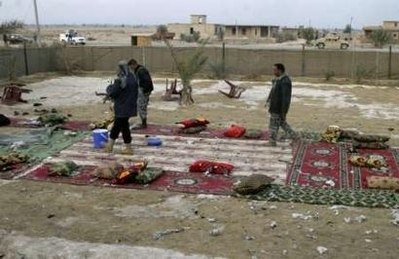Probe: Iraqi teen bomber sent by family
Updated: 2008-01-22 16:49
BAGHDAD -- His father was a senior member of al-Qaida in Iraq. His mother promised him they would meet again in paradise.
|
|
Details emerging in the investigation into a teenage suicide bombing near Fallujah on Sunday suggest the boy was dispatched by his family on the mission and took advantage of tribal ties to pass through tight security -- raising concerns about infiltration within Sunni groups now allied with US forces against extremists.
It also points to concerns that al-Qaida and its backers are still committed to campaigns of revenge and intimidation against fellow Sunnis even as insurgents try to regroup after being driven from strongholds across central Iraq.
The 15-year-old attacker was carrying a box of candy at a gathering of tribal members to celebrate the recent release of a relative, Hadi Hussein, who had been let go after more than a week in US custody, officials said. Hussein, his brother and four guards were killed in the blast.
The youth blew himself up in a reception area as Hussein was greeting well-wishers in the compound of Aeifan al-Issawi, a leading member of the Anbar Awakening Council -- the first Sunni group to publicly turn against al-Qaida in Iraq. Al-Issawi said he believed he was the target, but the bomber may have become nervous and detonated his explosives before he arrived.
"This is not the first time that we have been targeted by our relatives who live in the same area around us," said al-Issawi.
The Issawis represent one of the largest tribes in the province, which stretches west of Baghdad to the borders of Syria, Saudi Arabia and Jordan. The desert expanse provided a vast safehaven for al-Qaida in Iraq until Sunni leaders became fed up with the group's brutal tactics and joined forces with the Americans against it.
Anbar was once considered a lost cause for the Pentagon. But it turned into one of the military's most vaunted success stories as the Sunni groups in Anbar helped stir similar uprisings against al-Qaida in Sunni areas around Baghdad and elsewhere.
Marine Maj. Gen. Walter E. Gaskin, commander of the roughly 35,000 Marine and Army forces in Anbar, said earlier this month that levels of violence have dropped so significantly that the province will be returned to Iraqi control in March.
|
|
|
||
|
||
|
|
|
|



